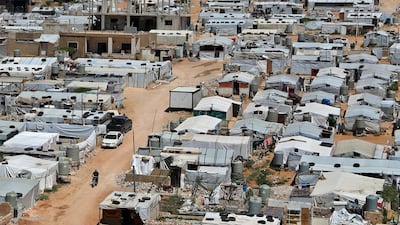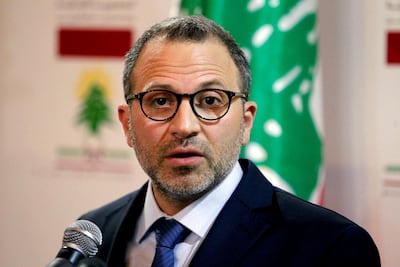“Long live the Lebanese people, Syrians out!” chant a hundred young men and women on the corner of a busy street in a northern suburb of Beirut. Some of them wear jackets that read: “You love Lebanon, you hire Lebanese.”
Omar, a tall, imposing 40-year-old from Homs in Syria, watches the demonstration on his phone again two weeks after it took place right outside his pastry shop and adjoining restaurant. He believes they were targeted because he is Syrian.
“I feel sad. The Lebanese people are better than this,” said the businessman, who asked for his real name not to be revealed.
As living conditions in Lebanon worsen and the government works on approving its first ever austerity budget, Lebanese public opinion is increasingly turning against the Syrian refugee population, who are accused of burdening the economy and infrastructure.
Many Lebanese accuse Syrians of stealing their jobs and accepting lower wages. Last year, President Michel Aoun said that 46 per cent of Lebanese were unemployed, although official figures are lower.
According to Labour Minister Camille Bou Sleiman, only 1,733 Syrians have a valid work permit, despite there being nearly one million Syrians registered with the UN refuge agency. Lebanese politicians regularly say that they believe there are as many as 500,000 more unregistered Syrians in the country.
Officially, Syrians can work only in agriculture, construction and cleaning jobs, but these rules are not respected, particularly in the hospitality sector. In Beirut, it is not uncommon for restaurants and bars to employ Syrians.
Mr Bou Sleiman has given employers until July 9 to legalise the situation of their foreign employees or face a penalty of 2 million Lebanese pounds (Dh4,870). If they continue breaking the law, the penalty increases and the company can be closed.
The minister's initiative is not political, he told The National. "I am trying to apply the law in a humane and respectful way."
Anti-Syrian feelings have been inflamed recently by statements made by Gebran Bassil, the foreign affairs minister and head of the Free Patriotic Movement, a political party founded by his father-in-law, President Aoun.
In a tweet in early June, he rejected “both the displaced and the refugees” and boasted about the superior “genetic” sense of belonging to Lebanon.
On June 8, the youth branch of the FPM organised a media stunt that involved entering in several shops in the Beirut suburb of Jdeideh and aggressively asking their managers whether they employ Syrians.
A report broadcast by OTV, a Lebanese television owned by President Aoun’s family, shows Omar, the pastry shop owner, looking exasperated as an FPM activist tells him that he does not believe that his employees’ paperwork is in order.
Omar, who fled Syria for Lebanon in 2013, told The National he employs both Lebanese and Syrians and that the latter have valid residence permits.
Some of his employees do not yet have a work permit, he said, but they are in the process of applying for one at the Labour Ministry. Foreign employees in Lebanon need both a residence permit and a work permit. Together they cost nearly 2 million pounds a year, and he splits the cost with his employees.
Omar said he felt he was being treated unfairly despite investing hundreds of thousands of dollars in his shops. “I have a friend who opened a shawarma shop in Turkey, and he got Turkish citizenship,” he mused. “I wish I could leave. Here, there’s a lot of psychological pressure." His application for asylum abroad through the UN was refused.
There are several factors that discourage Syrians from going home even though President Bashar Al Assad's forces have largely quelled the 2011 uprising against his rule. Young men want to avoid military conscription, while businessmen like Omar say that the economy in Syria is not good enough for investments. Other Syrians who spoke to The National mentioned unconfirmed reports of arbitrary detention and executions.
Claiming that Syria is safe today – although there is still fighting in the north-western region of Idlib – the Lebanese authorities are encouraging Syrians to go back.
General Security, one of the country’s most powerful intelligence agencies, says that more than 170,000 Syrians returned home between December 2017 and March 2019.
In the OTV report, an FPM activist shakes his finger in the face of a Syrian employee of a fast-food restaurant near Omar’s shop, telling him he should “go back to his country to rebuild it”.
The employee nods vigorously, seemingly in agreement and repeating "habibeh, habibeh", a Lebanese expression of polite endearment. When The National visited the restaurant two weeks later, he refused to be interviewed.
Some Lebanese activists have attempted to counter the anti-Syrian rhetoric. In mid-June, several hundred protesters gathered in downtown Beirut to oppose hate speech, holding signs such as "refugees welcome" and "racism is terrorism", reported local newspaper The Daily Star.
Online news website Daraj published a statement on Tuesday signed by dozens of researchers, writers and journalists condemning Mr Bassil's "racist hysteria" against Syrians "expelled from their country by their murderous regime".
"This propaganda is becoming very dangerous, especially with the increasing hostility towards refugees around the world," Daraj co-founder Diana Moukalled told The National. "We need to look at the figures. Syrian refugees contribute to the economy. They pay rent for their tents."
But Lebanese authorities are reacting with increasing hostility to pro-refugee rhetoric.
Following a roundtable organised by a local NGO on refugee rights and repatriation, General Security recently published a statement accusing the organisers of being “lackeys who hang out at the doors of this leader, or that embassy, or both” and who lack “the most minimal standards of professionalism in politics, media and academia”.
The NGO, Umam Documentation & Research, is funded by various European donors and regularly organises events advocating for refugee rights in the region.
General Security warned that it would take legal steps to “halt” its activities.


